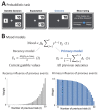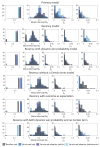The temporal representation of experience in subjective mood
- PMID: 34128464
- PMCID: PMC8241441
- DOI: 10.7554/eLife.62051
The temporal representation of experience in subjective mood
Abstract
Humans refer to their mood state regularly in day-to-day as well as clinical interactions. Theoretical accounts suggest that when reporting on our mood we integrate over the history of our experiences; yet, the temporal structure of this integration remains unexamined. Here, we use a computational approach to quantitatively answer this question and show that early events exert a stronger influence on reported mood (a primacy weighting) compared to recent events. We show that a Primacy model accounts better for mood reports compared to a range of alternative temporal representations across random, consistent, or dynamic reward environments, different age groups, and in both healthy and depressed participants. Moreover, we find evidence for neural encoding of the Primacy, but not the Recency, model in frontal brain regions related to mood regulation. These findings hold implications for the timing of events in experimental or clinical settings and suggest new directions for individualized mood interventions.
Trial registration: ClinicalTrials.gov NCT03388606.
Keywords: anterior cingulate cortex; computational psychiatry; fMRI; human; mood; neuroscience; primacy model; reward.
Conflict of interest statement
HK, CZ, DJ, KC, AV, RR, FP, DN, AS No competing interests declared
Figures










References
-
- Ambady N, Rosenthal R. Thin slices of expressive behavior as predictors of interpersonal consequences: a meta-analysis. Psychological Bulletin. 1992;111:256–274. doi: 10.1037/0033-2909.111.2.256. - DOI
-
- Braams BR, van Duijvenvoorde AC, Peper JS, Crone EA. Longitudinal changes in adolescent risk-taking: a comprehensive study of neural responses to rewards, pubertal development, and risk-taking behavior. Journal of Neuroscience. 2015;35:7226–7238. doi: 10.1523/JNEUROSCI.4764-14.2015. - DOI - PMC - PubMed
Publication types
MeSH terms
Associated data
Grants and funding
LinkOut - more resources
Full Text Sources
Medical

